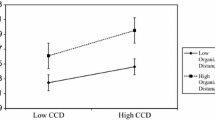Abstract
Corruption Perceptions Index (CPI) scores for 47 countries reported by Transparency International were used to ascertain determinants of bribe taking in international business. Two sets of independent variables – economic and cultural – were used in a multiple regression analysis. Results indicate that bribe taking was more likely to be prevalent in countries with low per capita income and lower disparities in income distribution. Cultural factors such as high power distance and high masculinity in a country were also likely to be associated with high level of bribe taking. Both economic and cultural factors were important explanatory factors of bribery. Implications of the findings for combating bribery are discussed.
Similar content being viewed by others
References
American Chamber of Commerce in Russia: 1995, June 26, ‘Chamber of Commerce Outlines Major Obstacles to Investment in the Russian Market – Overall Outlook Positive’, Press release. Moscow.
Andelman, D.: 1998, ‘Bribery: The New Global Outlaw’, Management Review, April, 49–51.
Beaty Gwynne (1993) The Outlaw Bank: A Wild Ride into the Secret Heart of BCCI Random House New York
Besley, T. and J. McLaren: 1993, ‘Taxes and Bribery: The Role of Wage Incentives’, The Economic Journal, 103 (January), 119–141.
S. Carmichael (1995) Business Ethics: The New Bottom Line Demos London
W. Cragg W. Woof (2002) ArticleTitle‘The U.S. Foreign Corrupt Practices Act: A study of its effectiveness’ Business and Society Review 107 IssueID1 98–144 Occurrence Handle10.1111/0045-3609.00129
G. Hofstede (1980) Culture’s Consequences: International Differences in Work-Related Values Sage Publications, Beverly Hills CA
B. Husted (1999) ArticleTitle‘Wealth, Culture, and Corruption’ Journal of International Business Studies 30 IssueID2 339–359 Occurrence Handle000084003700006
J. Lambsdorff (1998) ‘Corruption in Comparative Perception’ A. K. Jain (Eds) Economics of Corruption Kluwer Academics London
Lewis, P.: 1997, ‘2 Global Lenders Use Leverage to Combat Corruption’, The New York Times, August 13, A14.
P. Mauro (1995) ArticleTitle‘Corruption and Growth’ Quarterly Journal of Economics 110 IssueID3 681–712 Occurrence HandleA1995RN97800005
M. Morishima (1982) Why Has Japan Succeeded? Cambridge University Press Cambridge, UK
Moss, N.: 1997, ‘Who Bribes Win’, The European, December 11, 26–27.
OECD Observer: 2000, September, ‘The Fight Against Bribery and Corruption’.
Pitman, G. and J. Sanford: 1994, ‘The Foreign Corrupt Practices Act Revisited: Attempting to Regulate “Ethical Bribes” in Global Businesses’, International Journal of Purchasing and Materials Management, Summer, 15–20.
V. Ricjckegham B. Weder (1996) Corruption and the Rate of Temptation: Do Low Wages in the Civil Service Cause Corruption? International Monetary Fund Washington DC
Rose-Ackerman S. 1997, Corruption and Development. Paper presented at the annual World Bank Conference on Development Economics (World Bank, Washington, DC).
R. Simcha O. Shenkar (1985) ArticleTitle‘Clustering Countries on Attitudinal Dimensions: A Review and Synthesis’ Academy of Management Review 10 435–45
C. Sterling (1994) Thieves’ World Simon and Schuster New York
R. Theobald (1990) Corruption, Development and Underdevelopment Duke University Press Durham, NC
U.S. Department of Commerce (2003). Survey of current business. Washington, DC
www.worldbank.org (Website of the World Bank, Washington, DC).
www.transparency.org (Website of Transparency International, Berlin).
Yannaca-Small, C.: 1995, ‘Battling International Bribery’, The OECD Observer 192 (February–March), 16–17.
Author information
Authors and Affiliations
Corresponding author
Additional information
Rajib Sanyal is an American Council of Education Fellow at George Mason University for 2004–2005, on leave from The College of New Jersey, where he is a professor of management. Dr. Sanyal has published widely, and is the author of a textbook on International Management.
Rights and permissions
About this article
Cite this article
Sanyal, R. Determinants of Bribery in International Business: The Cultural and Economic Factors. J Bus Ethics 59, 139–145 (2005). https://doi.org/10.1007/s10551-005-3406-z
Issue Date:
DOI: https://doi.org/10.1007/s10551-005-3406-z




